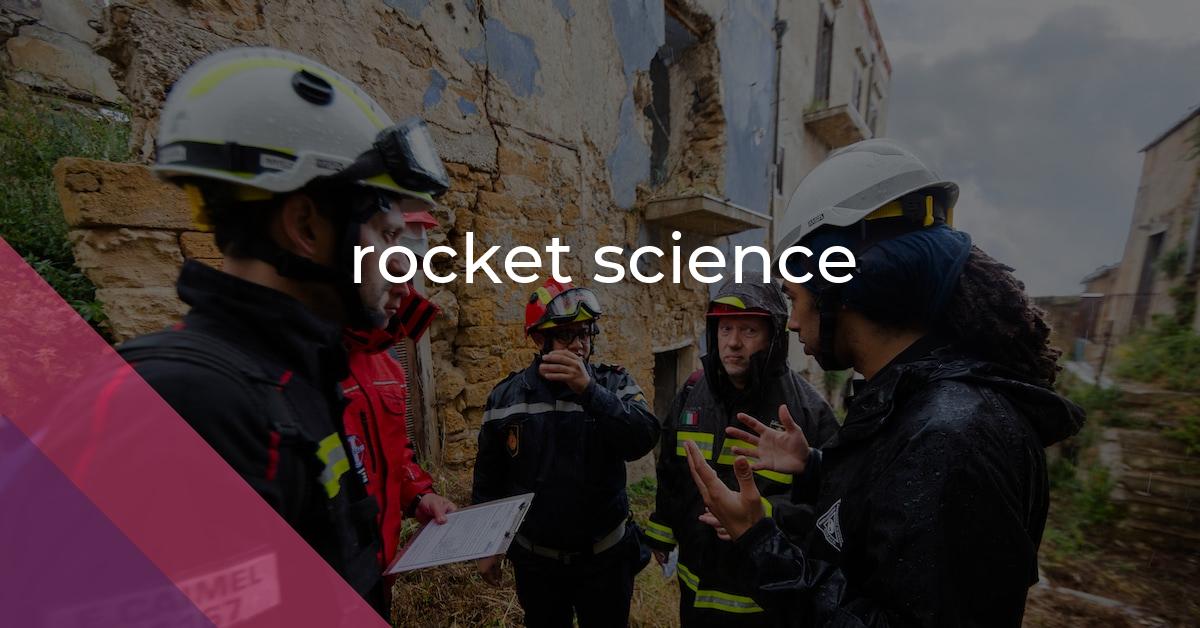rocket science: Idiom Meaning and Origin
What does ‘rocket science’ mean?
"Rocket science" is an idiom used to describe something that is very complex or difficult to understand.

Idiom Explorer
The idiom "rocking-horse shit" is a colorful way of describing something that is extremely rare or hard to find. It emphasizes the idea of something being as scarce as horse manure from a rocking horse, which doesn't exist in reality. The phrase is considered vulgar and used for comedic effect.
The idiom "rocking horse shit" means something that is extremely rare or hard to find. It is used to emphasize how uncommon or valuable something is.
The idiom "riddle wrapped in an enigma" means something or someone that is difficult to understand or explain because of their mysterious or complex nature.
The idiom "razor-sharp" means extremely sharp or precise.
An idiom used to describe someone or something that is highly unusual or unique; as rare as a rare animal.
The idiom "pull a rabbit out of a hat" means to do something unexpected or impossible, often used to describe performing a remarkable feat or finding a surprising solution to a problem.
The idiom "pie-in-the-sky" refers to something that is unrealistic or unlikely to happen. It describes a situation or idea that may seem appealing or enticing, but is not practical or achievable in reality.
The idiom "pie in the sky" means something that is unrealistic or unlikely to happen. It refers to a promise or idea that sounds good but is not practical or achievable.
The idiom "piece of work" refers to a person who is difficult to deal with or understand, often due to their complex or challenging behavior or personality.
Cracking the Complexity
Rocket science is an idiom widely used in American English to describe something that is extremely difficult or complex. The phrase itself is a metaphorical reference to the field of rocket science, which involves intricate calculations and scientific principles to design and build rockets.
The origin of the idiom remains unclear, but it is believed to have gained popularity in the mid-20th century. The expression is often associated with the United States' space program in the 1960s, during which the country was engaged in a fierce competition with the Soviet Union to explore outer space.
One possible source of the idiom is the widespread coverage of the Apollo space program, particularly the mission to the moon, by the media during that time. The immense complexity and technicalities involved in space exploration led to the popularization of the phrase as a metaphor for anything that required extraordinary aptitude to comprehend or achieve.
Over time, the idiom has become deeply ingrained in American English and is frequently used in various contexts. Its usage extends beyond the scientific or technical realm and is often employed in everyday conversations, writings, and even in advertising or marketing campaigns.
As an idiom, "rocket science" does not constitute literal rocketry knowledge but is rather a figurative expression. It conveys the perception that a task or concept is complicated, beyond the comprehension of the average person, and necessitates an expertise comparable to that of a rocket scientist. The idiom effectively serves to highlight the immense difficulty of a particular undertaking or idea.
Despite its popularity, the idiom is subjective and can be interpreted differently depending on the individual. While some may find concepts from quantum mechanics or advanced mathematical equations to be challenging, others may consider managing complex financial portfolios or deciphering legal jargon as the equivalent of rocket science.
It is worth noting that the idiom "rocket science" is often used humorously or sarcastically to emphasize the simplicity of a task or to mock someone who claims that an obviously straightforward matter is complicated.
Let's explore two related idioms that are frequently associated with rocket science: "over one's head" and "brain surgery."
The idiom "over one's head" is used to describe something that is too difficult or complex for someone to understand or grasp. It implies that the person lacks the knowledge or expertise to comprehend the subject matter. This idiom is often used in situations when someone is struggling to understand a concept or is unable to keep up with a conversation due to its complexity.
Similarly, the idiom "brain surgery" is used to refer to something that is extremely difficult or requires a high level of skill and precision to accomplish. It signifies a task or undertaking that requires a great deal of expertise or specialized knowledge. The idiom is often used to emphasize the complexity and difficulty of a task, particularly when someone underestimates its intricacy.
Both of these idioms, "over one's head" and "brain surgery," can be used in conjunction with the idiom "rocket science" to convey the idea of extreme difficulty or complexity. Just as rocket science requires specialized knowledge and skills, tasks or concepts that are described using these idioms require a level of expertise beyond the average person's capabilities.
For example, if someone says, "Understanding Einstein's theory of relativity is like rocket science, it's over my head," they are expressing that the concept is too challenging for them to comprehend. Alternatively, if someone says, "Fixing a car engine is not brain surgery, anyone can do it," they are implying that the task is not as difficult as it may seem.
Overall, these idioms provide additional layers of meaning and depth when used in conjunction with the idiom "rocket science." They enhance our understanding of the complexity and difficulty associated with various tasks or concepts and allow us to convey these ideas in a relatable and vivid manner.
Example usage
The idiom "rocket science" can be used in a sentence in the following ways:
- Understanding Calculus is not rocket science, with enough practice anyone can master it.
- John was struggling to follow the complicated instructions, but for Mary it was a breeze - it's not rocket science for her.
- While some may find programming difficult, it is not rocket science to those who have studied it for years.
More "Science" idioms



